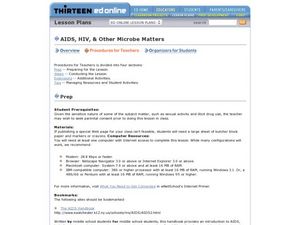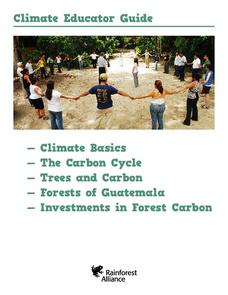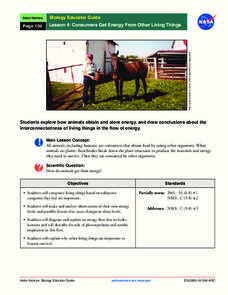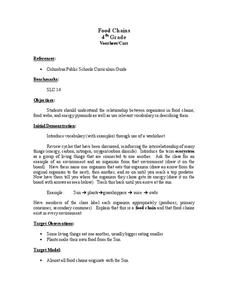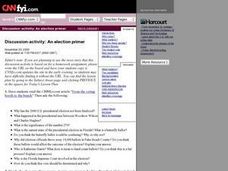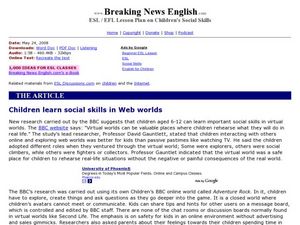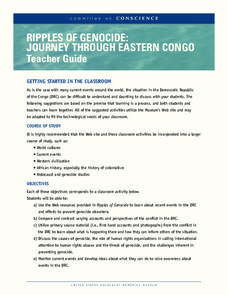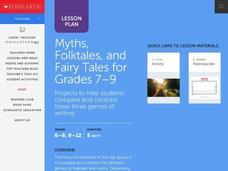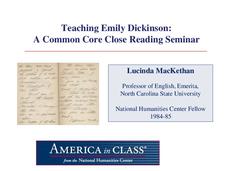Curated OER
AIDS, HIV and other Microbe Matters
This series of lessons contains sensitive material. Please review to ensure that the content is suitable for your class. It begins by discussing what microbes are. Scholars are then asked to review a few online resources and answer...
Curated OER
The Memory Invention
Young writers edit their writing to make sure it shows good meaning and clarity. In this writing lesson plan, students are given a variety of "What If?" scenarios to choose from as writing prompts. A class discussion ensues, which...
Curated OER
Polar Food Web Comparison
Seventh graders practice the evaluation component of the scientific method while comparing and contrasting the similarities and differences of the food chains and webs of polar animal life. They study about classification and ecology...
Curated OER
Communication--Conversation
In this communication and conversation learning exercise, learners web out the skills they think people need to have to be able to have successful conversations.
Curated OER
RESPECT -- A Basic Skill
Seventh graders are shown a variety of advertisements and commercials and note the product being sold. As a class, they compare and contrast their answer to the actual product. To end the lesson, they discuss whether or not they would...
Rainforest Alliance
Climate Educator Guide
Climate change is a hot topic in the news. Class members examine carbon dioxide data to analyze trends of our atmospheric makeup over time. They also discuss climate and climate change, and determine how these changes are affecting life...
NASA
Decomposers Get Energy From Dead Things
When life gives you mold, make penicillin. Scholars design an inquiry experiment to determine what causes rotting and mold growth. It also covers decomposers and the important role they play for other living things.
Curated OER
Survival Challenge: Would You Make It?
Students face a challenge. In this survival lesson, students discover the hardships faced by the pioneers who moved west and see if they would survive a similar situation. They discuss essential items they need to survive and...
NASA
Producers Make Their Own Food
During an inquiry-based lesson, scholars decide which variable to test and then design an experiment to determine the needs of producers. After two weeks, they complete a full analysis and research paper.
NASA
Consumers Get Energy From Other Living Things
How do plants and animals get their food? Learn about where energy comes from, how animals store energy, and aerobic respiration, in a instructional activity that allows scholars to diagram energy flows.
NASA
Biology Training Conclusion
Gravity is just one consideration when determining human habitability on a new planet. The lesson connects four different units and starts with connecting the various systems: planetary systems, human body systems, etc. After scholars...
Curated OER
Food Chains
Fourth graders investigate food chains. They review cycles and discuss ecosystems. They select an environment and create a food chain in small groups. They write their food chain and label it for the class to evaluate. They create...
Curated OER
Food Webs
Students create a bulletin board display illustrating food chains they make from a list of ocean organisms. Students also play a game showing what happens when one of the organisms is removed from the food chain and how they are all...
Curated OER
Discussion-Activity: An Election Primer
Students research and discuss the 2000 presidential election. They role-play Al Gore's and George W. Bush's legal teams, and members of the Florida Supreme Court. They of each legal team present their arguments to the Supreme Court.
Curated OER
Breaking News English: Children Learn Social Skills in Web World
In this English worksheet, students read "Children Learn Social Skills in Web World," and then respond to 1 essay, 47 fill in the blank, 7 short answer, 20 matching, and 8 true or false questions about the selection.
Curated OER
Circle Justice—Lesson 1: The Anger Within
Learners examine the emotion of anger through the poem 'A Poison Tree'. In this poetry analysis lesson, students identify and decode unfamiliar vocabulary they encounter, engage in groups discussions and complete several writing...
Curated OER
In the Middle - Middle School Poetry
Students analyze and interpret poems. In this poetry lesson, students are read poems aloud, discuss the meanings in groups, and complete two worksheets after listening to the poems. Links to the worksheets and discussion questions are...
US Holocaust Museum
Ripples of Genocide: Journey through Eastern Congo
Could you locate the Democratic Republic of Congo on a map? Scholars investigate the genocide taking place in Eastern Congo. Groups explore web-based evidence as well as the Ripples in Genocide source to take a closer look at the issue....
Syracuse City School District
Literary Elements
Address the literary elements in a piece of writing using these materials. The packet includes plenty of resources, and focuses mainly on theme, character, and point of view, with some materials for setting, symbolism, and author's...
Scholastic
Perfect Postcards: California
It's time to hear about some adventures in travel! The Transcontinental Railroad changed life and travel in the United States during the 1800s. Practicing online research skills, pupils discover the features they would like to visit on...
Curated OER
Bering Sea Buffet - A Foodweb Activity
Life in the Bering Sea, food webs, and the ocean ecosystem are introduced with a map activity. The lesson starts as kids explore maps and images of the Bering Sea, then it kicks into high gear as they start to discuss the types of...
Scholastic
Myths, Folktales, & Fairy Tales for Grades 7-9
Here is a must-have resource for studying fairy tales, myths, and folktales with your class! It includes instructional ideas, activities, and materials to support a month-long review of these three unique genres of writing.
Sargent Art
Protect Our Marine Life
Encourage water conservation and boost art skills with a hands-on activity that challenges young painters to create a scene highlighting marine life. Using oil pastels, scholars draw an underwater scene and write a tip for viewers to...
National Humanities Center
Teaching Emily Dickinson: A Common Core Close Reading Seminar
Three of Emily Dickinson's poems, "I like to see it," "Because I could not stop for Death," and "We grow accustomed to the Dark," provide instructors with an opportunity to model for class members how to use close reading strategies to...


